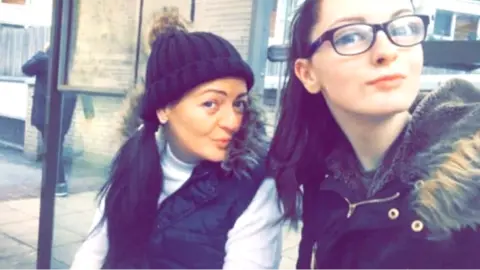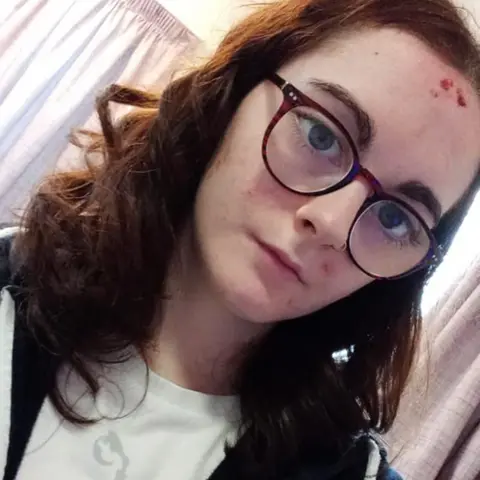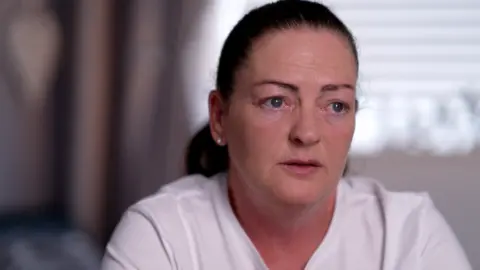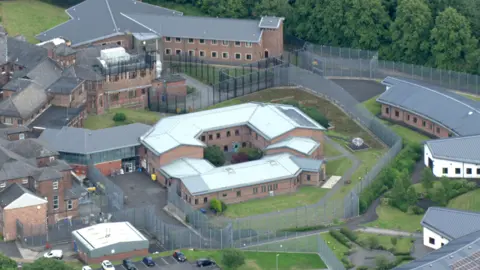Years of scandal and promises as patients suffer
 BBC
BBC"Everything in this place has made me worse."
In those few words, 22-year-old Olivia sums up the failure in the care she has experienced at Edenfield NHS mental health hospital.
Panorama's undercover filming shows the bullying, swearing and mocking that she is subjected to by staff.
Her distress is echoed by 23-year-old Harley, when she says: "This place is killing me".
The hidden camera shows her being restrained and spending weeks in seclusion.
But both their young lives identify a much deeper failure in the mental health system.
The tragedy is that it is one we have known about for a long time.
For more than a decade, Panorama's undercover cameras have exposed failings in different mental health hospitals.
I have reported on those stories and others which have regularly painted a picture of overstretched and under-resourced mental health services.
I have sat with families as they have described, often in tears, their shock at the treatment of the person they love.
In each case, that person had become so challenging their families couldn't cope.
Parents also described the battle they faced trying to get early help when their child, often reaching their teenage years, was heading towards a predictable crisis.
Many had a diagnosis of autism or learning disabilities, like Harley. With others like Olivia it took time for a clear diagnosis for their mental distress.
But their experience underlines the gap between promises made following a scandal and the reality of care for too many patients.

Official report after official report has concluded that mental health units like Edenfield are not helpful for someone on the autistic spectrum, like Harley.
Even if care is good, the noise and intensity of a secure mental health unit can trigger anxiety and the type of challenging behaviour that led to them being admitted.
Experts say it can be an overload the senses, with the high fences and locked doors amplifying the difficulties.
Yet Harley is one of just under 2,000 people with autism and/or learning disabilities in England, who are currently living in in-patient units.

A BBC Panorama undercover investigation has found evidence that a secure NHS psychiatric hospital is failing to protect some of its vulnerable patients.
Available now on BBC iPlayer(UK Only)

In 2011, Panorama exposed the abuse of patients in Winterbourne View private hospital near Bristol.
There was a national outcry. It was promised that the inappropriate placement of people with learning disabilities or autism in hospitals would end.
Crucially, better services were promised in the community, including sufficient crisis intervention to try to keep people out of hospitals.
That was also the year when the coalition government set out what it called an ambitious strategy to ensure parity of esteem between mental health and physical health services. Subsequent governments have also promised to improve mental health services.
At that time Harley was 13, already struggling and already spending time in in-patient units.
In 2011, Olivia was 10. She was also finding it difficult to navigate everyday life.
She was bullied at school and by her mid-teens she was harming herself. Her behaviour escalated until she was trying to take her own life.
Her mother, Diane, says it reached the point where she could no longer cope at home. And there was nowhere near enough help in the community.
"I couldn't manage the things she was doing," says Diane. "With Olivia being in a mental health hospital, I thought she would get the help and support she needed."

In December 2018, Olivia arrived on the adult wards at Edenfield aged 18. Before that she was in several other units.
Olivia has since been diagnosed with emotionally unstable personality disorder (EUPD).
"She's just been shoved around here, there and everywhere," says Diane. "It's like no-one gives a shit."
It was also the year the government asked the care regulator, the Care Quality Commission (CQC), to review the use of restraint, seclusion and segregation for people with mental health problems, learning disabilities or autism.
That was prompted by the case of 15-year-old Bethany, who was severely autistic and spent two years in isolation in a mental health unit. Her story was highlighted by the BBC's File on Four programme.
The CQC's conclusions published thefollowing year were damning. Inspectors concluded the treatment some people received was inhumane and "not fit for purpose". Some patients had been segregated from others for more than a year.
It was in 2019 that Panorama went undercover to expose the culture in Whorlton Hall, a specialist hospital in County Durham.
The then Health and Social Care Secretary Matt Hancock dubbed it a broken system and again promised change.
Three years later and the undercover filming at Edenfield shows another toxic culture and a place where restraint and seclusion seem commonplace.
This has been Olivia and Harley's world. Their families fear their experiences of restraint, seclusion and the culture of the place have increased their problems.
The Department of Health and Social Care says restrictive interventions should only be used as a last resort, and that recent legislation aims to reduce the inappropriate use of force and ensure accountability.
Again, report after report has underlined the importance of providing staff with the knowledge and skills to properly support patients - particularly those with autism.
We don't know what training those staff had, but Panorama's undercover reporter had a one-day online course before starting work. It did not cover autism.

As a healthcare worker, he was paid the minimum wage - £9.50 an hour. Nearly all supermarkets pay people more for stacking shelves.
The hospital already struggles to recruit enough staff and the cost-of-living crisis is likely to intensify that problem with better pay on offer elsewhere.
It is worth noting that care for a patient at Edenfield costs in the region of £200,000 a year.
There has been investment in community-based services and in moving people out of hospitals where appropriate, but earlier this year, the CQC said that progress was limited.
The Greater Manchester Mental Health Foundation Trust, which runs Edenfield, says it is taking the allegations in the Panorama very seriously and has taken action to safeguard patients, including suspending some staff.
It also says: "We owe it to our patients, their families and carers, the public and our staff that these allegations are fully investigated to ensure we provide the best care, every day, for all the communities we serve."
So far, Olivia has spent three and a half years at Edenfield. And after two years there, Harley has been moved to another hospital.
Both remain very unwell and their behaviour is still challenging. When Olivia says the place is making her worse, and Harley that it is killing her, they are telling us this isn't working.
It raises a question that is far wider than one hospital - what difference might it have made in their young lives if promises made more than a decade ago had led to more help when they first needed it?
